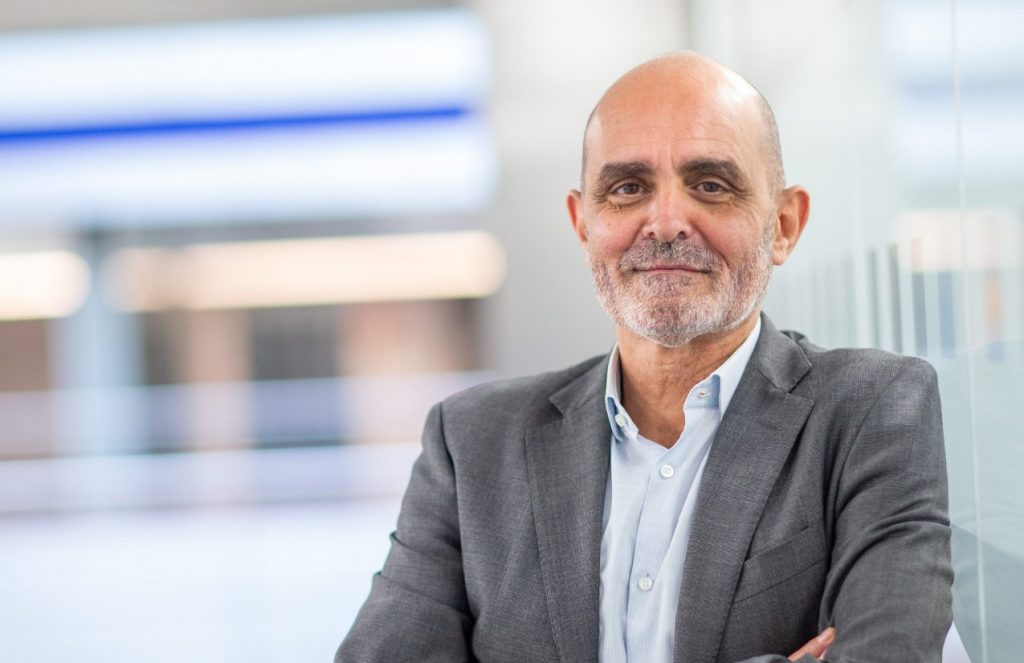'In towns there will be retail outlets where customers can withdraw cash' - 'Spanish banks are among the most competitive in Europe and charge the lowest fees' - 'Lay-offs in the sector are being implemented with better conditions than in other sectors'
Alberto Aza, CECA's spokesperson, was in Malaga yesterday on the occasion of the interview-colloquium that CECA's Obra y Acción Social ambassador, Ona Carbonell, offered at the Unicaja Basketball Club facilities in Los Guindos, within the framework of Unicaja's Edufinet project. Aza reviews the current state of the financial sector, the controversial branch and employment adjustment processes (Unicaja Banco itself is currently negotiating lay-offs), fintech competition and the Next Generation horizon. CECA includes credit institutions and banking foundations with almost €900 billion in assets.
In 2013 the Savings Banks and Banking Foundations Act reconverted the sector by separating the former savings banks into two entities: on the one hand, banks, and on the other, foundations to manage Obra Social. Eight years on, is the model working?
It has been a successful model that is working very well. At the time, the regulator clearly understood that the differential element of the former savings banks, the Obra Social, existed, and that is why the role of the foundations was recognised. With the distribution of dividends, where foundations hold a significant shareholding in the banks, this success can also be ensured. Obra Social continues to be a core activity.
What work does CECA currently undertake?
We are a banking association with almost a century of history (founded in 1928) representing 40% of the market in Spain. CECA is a key player in the sector, not only because of its experience and track record, but also because of the Obra Social that is at the very origin of the savings banks. Its articles of association already stated that its purpose was social: supporting the most disadvantaged. This spirit, which dates back 300 years to the emergence of the mounts of piety, continues to be valid today.
The landscape has been very turbulent in recent years: negative ECB rates, fintech competition, and now the pandemic. How has the sector managed to improve its profitability?
It is true that there are different conditioning factors (exogenous but with a direct impact on its activity) that set the pace of banking. The profitability of the sector is driven by different vectors. The first is the search for efficiency, which is being attained through digitalisation. This serves to improve internal processes and the relationship with customers, who prefer online and mobile channels. On the other hand, there is an awareness that bank branches are becoming increasingly less relevant in this relationship between the customer and financial institutions. There is little operational activity in branches. There is currently an overcapacity that will be adapted to the new circumstances.
Banks seem to be on an upward trend in charging customer fees.
It's another formula for improving profitability. Banking, like any other sector, provides a series of services that have a cost and an investment. They must therefore be charged. I can say that Spanish banks obtain 25% of their income from fees, while in countries such as France or Germany it is 35%. The average in Europe is over 30%. What I mean by this is that the Spanish banking system is one of the most competitive in Europe. Fees are another tool used for competitive purposes and will be handled with caution. It will be up to each entity to make its own decision.
You mentioned the branch closure process. What happens to all those people in rural areas, many of them elderly, who are left without their branch and ATM? Not everyone uses new technologies.
The depopulated Spain represents that 3% of the population that lives in small towns, with elderly people and where, in effect, they are being left with no branches. What are banks doing? Working with alternative channels, such as mobile branches. At CECA we already have around twenty of these, and each year they travel the equivalent of 1.7 times the perimeter of the Earth across all these inland territories. Any transaction available in a traditional branch, including cash withdrawals, can be carried out at these branches. A network of itinerant financial agents is also being deployed and now covers a network of more than 1,000 Spanish municipalities. Another approach is to use non-bank agents (pharmacies, bars, shops) to allow residents to withdraw cash. This is already done in the United Kingdom or the United States, using for example supermarkets. In Spain, agreements are being finalised to provide such services at post offices. I believe that we must understand that the phenomenon of depopulation affects all sectors. Under no circumstances is banking responsible.
Employment cuts are another contentious issue. We are living in an era of bank lay-offs, the most recent in Unicaja after the absorption of Liberbank.
The context in which banks are operating is difficult, with negative interest rates since 2014, something that nobody expected and that, as we have said, affects profitability. Downsizing is also a response to the pursuit of greater efficiency. But I would also like to recall that lay-offs within the sector are being negotiated and, possibly, with better conditions than in other sectors. Moreover, bank staff are highly qualified and in many cases can be easily re-employed.
European Next Generation funds are coming. What role should banks play?
It must play a key role. One of the variables used when making growth predictions is that European funds must be properly executed, and this means that they must go to viable projects that have the capacity to transform the productive fabric in a sustained manner and that also serve to mobilise private investors. Banks have a lot to contribute here, because if there is one thing they know about, it is analysing investment projects and their viability, with the possibility of advancing funds and co-financing initiatives. Spanish banks, with their commercial network, have the capacity to channel all this. We saw this with the ICO loans. Spain was the second EU country after France in terms of the number of loans granted, and this was thanks to the network of branches.
Behemoths such as Amazon and Google have already expressed interest in providing banking services. Do you fear such competition?
We have always said that competition is not only good but also necessary because it drives innovation. These technology firms are collaborating with banks or helping the sector move forward. However, it is also true that if we are competing on the same playing field, then we must all be subject to the same rules and the same regulations, which are one of the strictest in Europe. This should be done not only to promote fair competition but also to ensure consumer protection and the financial stability of the system.
What are your views on cryptocurrencies?
Cryptocurrency, like any asset in which it is possible to invest (and in this case, with a strong speculative component), must be properly supervised. And the public must also know what it is getting into. We are concerned that 12% of young people between the ages of 18 and 25, according to studies, are already cryptocurrency investors, often without the proper knowledge and taking excessive risks. This can make them easy prey to financial fraud.













